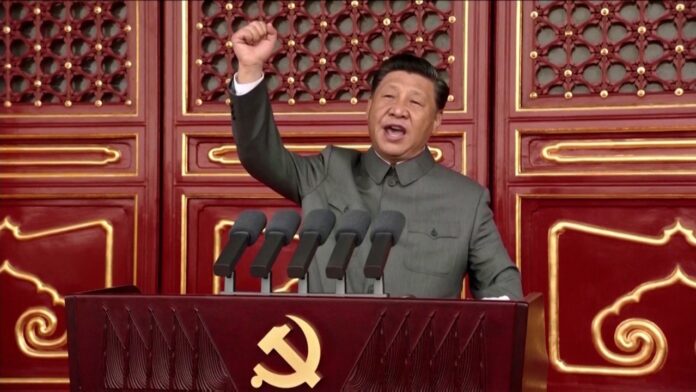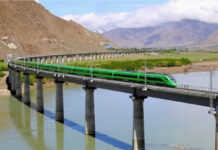The Chinese Communist Party celebrated its 100th birth anniversary. CCP General Secretary Xi Jinping delivered a much anticipated speech on the occasion. Being a centenary speech, it had obvious political significance. It sums up the state of affairs of what the “leader at the core” feels about the past, present and future. Taken together with other speeches, Xi announced that China would continue to build a prosperous socialist society, modernise the socialist economy, build its technological capacities, make the PLA stronger and deal with the world on its own terms as a confident nation.
By Arvind Gupta
Xi recounted the achievements of the Party from its inception 100 years ago when it began with 50 members to now when it has about 95 million members. In its century long existence, the CCP has emerged as a formidable machine that has led the people, delivered growth and prosperity while maintaining a highly controlled authoritarian political system in which no deviations are allowed. Even the critics would concede that China’s growth journey, despite massive upheavals like the Great Leap Forward and the Cultural Revolution in which millions died, has been remarkable.
The Party takes the credit for transforming China from being a poor, backward, intensely humiliated country to one being a strong and proud nation having established a “moderately prosperous society” and well on way to becoming “a great modern socialist country in all respects.” Xi underlined that the “great rejuvenation” of the Chinese people is the “ultimate theme” of the CCP since the “intense humiliation” suffered following the Opium Wars of 1840. In the great transformation of China, he said, “the Party has united and led the Chinese people in pursuing a great struggle, a great project, a great cause, and a great dream through a spirit of self-confidence, self-reliance, andinnovation, achieving great success for socialism with Chinese characteristics in the new era.”
Xi repeatedly emphasised that the Party is the leader of the people and will remain so. There would be no compromise on that. Those who deviate from these principles will be firmly dealt with. Xi underscored the need for political unity, adherence to socialism with Chinese characteristics, and the need to root out corruption. Xi also exhorted the Party members to align with the “core” of the leadership. He underlined, “We must ensure that the Party preserves its essence, colour, and character, and see that it always serves as the strong leadership core in the course of upholding and developing socialism with Chinese characteristics in the new era.” (emphasis added). That was a veiled warning to those who might have doubts as to who is in the saddle.
The People’s Liberation Army (PLA), the indispensable instrument of the CCP machine, was mentioned in glowing terms. At the same time, the Party’s leadership of the PLA was also mentioned explicitly. PLA would be provided resources for making it strong.
Recalling the historic landmarks of the Party’s 100-year journey, Xi paidtribute to the “historic contributions” of MaoZedong, Deng Xiaoping, Jiang Zemin and Hu Jintao towards the “founding, consolidation, and development of the Communist Party of China.” By mentioning these names, he was not only signalling continuity in Party evolution but also including himself in the pantheon of Party greats. He even wore a Mao suit while delivering the speech. It is a different matter that unlike Deng Xiaoping and other leaders, Xi is taking the party to the days of strict party control and purges as prevailed during Mao’s time.
Without mentioning his own name Xi made several references to the current policies in the ‘new era’ of which he is the architect. He referred to phrases like ‘rejuvenation’, Belt and Road Initiative, a “community of shared interests”, the “5-sphere integrated plan”, and such phrases that have come to define his policies. These policies will continue in the ‘new era’. That is the rationale for his having removed the 2-term limit on himself.
On external relations, his references were brief but sharp. Unification with Taiwan was mentioned as a ‘historic mission’. Hongkong was also mentioned but Tibet and Xinjiang were omitted. China would build a “human community of shared interests” and a “new type of international relations”. It would follow independent policies based on its unique thought and culture. China’s glorious 5000-year civilisation was mentioned. China would not countenance any external interference. Those who try to interfere will meet the great steel wall of China. There was a warning too to the outside world: “We have never bullied, oppressed, or subjugated the people of any other country, and we never will. By the same token, we will never allow any foreign force to bully, oppress, or subjugate us. Anyone who would attempt to do so will find themselves on a collision course with a great wall of steel forged by over 1.4 billion Chinese people.”
Assessment
As is his wont, Xi played the nationalist card to the hilt. A strong nationalist agenda could be at the expense of other countries. Strong nationalism will continue to define Xi’s policies.
The Party will not relinquish its leadership position. Xi will remain at the ‘core’ of the leadership. No deviation from the Party line would be tolerated. The Party is the only representative of the people.
China will follow “socialism with Chinese characteristics”. This implies that China will steer its unique, self-reliant path. Do not expect compliance with the existing rule based order if it does not suit China.
The Party will root out corruption and enforce ideological compliance at all levels. There would be no leniency on that.
Xi’s references to foreign policy were few and mostly on expected lines. There was a hard message for those who might take China lightly and try to subdue it.
Xi has signalled that he is firmly in control of Party affairs. However, it would be too rash to reach definitive conclusions. In an opaque system such as that of China, it is difficult to assess what is going on behind the scenes. It does not take much for the scene to change, as happened in the USSR. But CCP must have learnt lessons from the Soviet experience. It would not allow glasnost and perestroika type of policies. Reform will be highly regulated and controlled.
With celebrations over, the stage has been set for the 20th Party Congress due in 2022. Between now and then a lot can happen in China.
China is sensitive to the external environment. The US’s renewed pivot to Asia could create new situations and new headaches for Xi.
But the now confident, strong China under Xi will not hesitate to adopt confrontationist positions if need be.
For Xi, political stability in the country is of paramount importance. He is also apprehensive of the West’s efforts to destabilise the Chinese system. He would carefully watch the US moves.
CCP has delivered growth and prosperity to the country. But the country has become highly unequal. The rural-urban income gap has increased. The aspirations of the people have skyrocketed. The horse of nationalism is bolting and could go out of control. Xi, because of several purges he has carried out, would have made enemies, but whether all this leads to a fundamental change in China is highly uncertain. Xi would like to avoid the mistakes made by Gorbachev who tried to liberalise the Soviet Communist Party and thereby hastened its collapse. Liberalisation in China is out of the question. The regime will become more repressive. But when will repression run its course, no one can say with certainty. India would need to watch Chinese developments carefully.
Whatever happens in China has an immediate impact on India. India needs to improve its China watching capabilities by focussing on the party and party institutions. India-China relations are likely to remain rocky if Xi’s version of China’s development unfolds.
This article first appeared in www.vifindia.org and it belongs to them.








